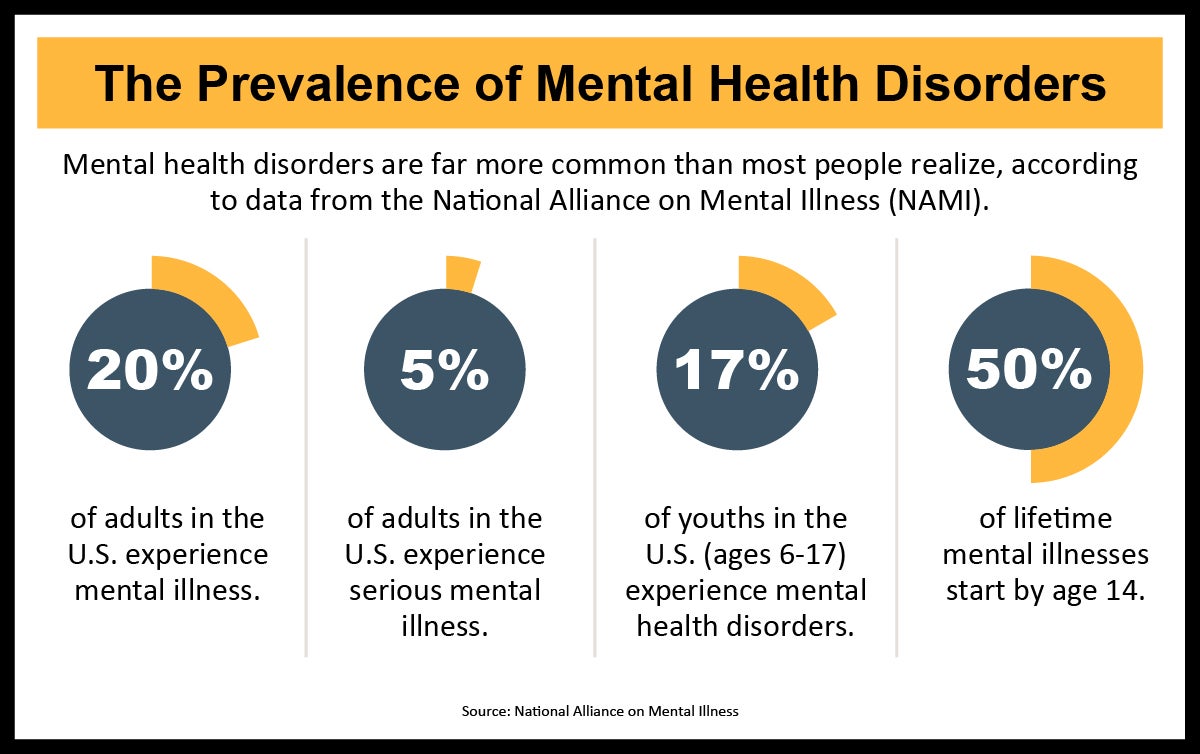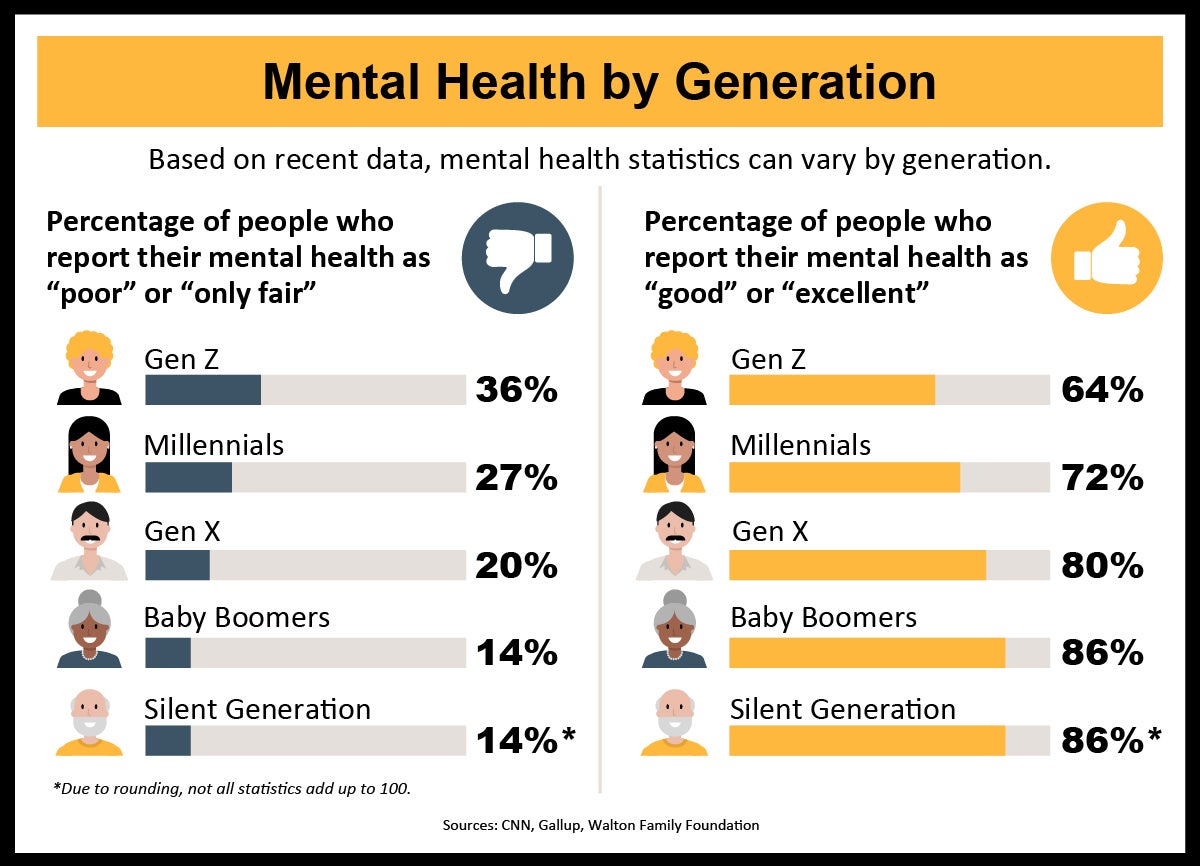From Boomers to Zoomers: Cross-Generational Challenges for Future Counselors

Given the wide diversity of the United States, counseling and mental health treatment can’t take a one-size-fits-all approach. Differences in gender, race, education, financial stability, social status, environment, and biological factors all play a role in an individual’s overall well-being and the mental health challenges that pose the highest risk.
Although counseling strategies surrounding mental health are highly personalized, experts in the field are still looking for ways to effectively group populations. One method that’s gained traction is categorizing patients by generation. This isn’t to say that all patients born during the same period share the same mental health profile. However, a cross-generational approach can serve as an effective blueprint.
With countless studies conducted over the decades, mental health thought leaders have gathered evidence to support a generational mental health theory. Essentially, generation-specific variables make certain mental health issues more prominent within specific age groups.
For example, the Greatest Generation’s trauma and dread surrounding World War II is a generation-specific mental health issue not shared with younger demographics like Gen Z. Comparatively, the Greatest Generation isn’t immersed in internet culture and social media like Gen Z, making them relatively immune to internet-related anxieties and stressors.
By applying a cross-generational approach to mental health, counselors are recognizing the importance of addressing the unique needs of different age groups. Cross-generational mental health counselors and resources play a crucial role in this context, as they’re specially trained and equipped to handle the diverse challenges presented by clients across the life span—from children to older adults. Incorporating these specialized practices is reshaping the mental health landscape in several key ways, enhancing the effectiveness and inclusivity of mental health services.
The Current State of the Mental Health Landscape
Not long ago, speaking openly about mental health struggles was considered too personal, a sign of weakness, or an indication that the person in question was broken beyond repair. One significant change in the mental health landscape has been the decrease of stigma surrounding the subject, with younger generations leading the charge.
In the age of oversharing on social media, mental health has become part of the mainstream conversation. It joined other subjects often considered personal rather than public, such as religion, politics, and hot-button healthcare issues, marking a noteworthy generational shift.
The mental health landscape is now largely characterized by growing awareness; increasing demand for services; and significant challenges related to access, equity, and treatment quality across diverse populations. As mental health gains recognition as a critical component of overall health, several key trends and issues have emerged to define the current landscape.
Cross-Generational Mental Health Counseling Defined
Cross-generational mental health counseling is a therapeutic approach that focuses on addressing the mental health needs of individuals across different age groups, recognizing that each life stage presents unique psychological challenges and opportunities for growth. This type of counseling is mindful of the differences in developmental stages, life experiences, cultural contexts, and historical backgrounds that influence mental health.
The Pew Research Center categorizes generations as follows:
- Greatest Generation: Born 1901–1927
- Silent Generation: Born 1928–1945
- Baby boomer generation: Born 1946–1964
- Generation X: Born 1965–1980
- Generation Y (millennials): Born 1981–1996
- Generation Z: Born 1997–2012
- Generation Alpha: Born 2013–present
Top Mental Health Challenges by Generation
Cross-generational mental health counseling recognizes and respects the diversity of experiences across different life stages, providing more effective and compassionate mental health care. This approach not only helps individuals but also strengthens familial and societal bonds and contributes to the overall well-being of communities.
Because demographics can influence counseling strategies, understanding the defining characteristics of each generation is crucial to identifying how they can affect mental health. Of course, demographic generalizations should never take precedence over individual assessments.
Greatest Generation
The Greatest Generation suffered through the Great Depression and World War II, enduring considerable hardship. The Greatest Generation was also defined by patriotism, work ethic, frugality, faith, and loyalty.
Complex emotions surrounding the experiences of the 1930s and 1940s have contributed to mental health struggles. Further complicating the issue, this generation didn’t have widespread access to mental resources, and mental health wasn’t a subject that people felt comfortable openly speaking about. This meant those affected by the horrors of war and the harsh economic conditions of the Great Depression often internalized their mental health issues.
Fewer than 100,000 members of the Greatest Generation are still alive in the United States, and many are struggling with problems relating to aging, grief, and mortality. For counselors, this means delivering compassionate care that factors in the emotional complexities deeply rooted in their past.
Silent Generation
Although the Silent Generation may have avoided the worst of the Great Depression and World War II, significant traumas lingered. The Silent Generation grew up during a time of economic and political uncertainty and has been characterized as being more conformist, playing by the rules, and less likely to speak up out of fear of consequences.
Because of this generation’s penchant for stoicism and self-reliance, its members have had difficulty recognizing their mental health struggles and are less likely to seek help. However, for those who do, most challenges are related to aging, physical and mental decline, chronic illness, isolation, and grief. Counseling strategies require a sensitive approach that’s mindful of the stigmas this generation has about mental health. Moreover, counselors must consider integrating their mental health services with primary care for a comprehensive app
Baby Boomers
The moniker “baby boomers” came from the massive surge in births after World War II. Unlike the Silent Generation before them, baby boomers are known for their defiance and outspoken nature, especially regarding issues such as civil rights and the Vietnam War. Whereas previous generations were more likely to support U.S. military involvement in overseas wars, many baby boomers protested against the Vietnam War. A large portion of baby boomers also served in the Vietnam War, which present unique mental health challenges. Those who returned may have post-traumatic stress or may have been shamed for their involvement in the war.
Many members of the baby boomer generation are struggling with what it means to live as older adults. Due to financial strain, many are opting to delay retirement, so they can continue their careers. Plus, they must manage the chronic health issues that are common among adults their age. According to the World Health Organization (WHO), approximately 14% of people aged 60 or older have at least one mental health disorder.
Although baby boomers are generally considered to be more progressive than previous generations, counselors should keep in mind that they grew up in an era when mental health problems remained taboo. Therapist.com suggests that baby boomers can protect their mental health by connecting socially, exercising regularly, engaging in hobbies, learning new skills, practicing mindfulness (meditation, yoga), and speaking openly about their mental health challenges.
Generation X
Generation X marks a significant shift in culture and the mental health landscape. Often dubbed the “MTV generation,” Gen Xers brought the LGBTQIA+ population into mainstream media and lived through the AIDS epidemic of the ’80s and ’90s. Another distinction of Gen Xers is the rise of helicopter parenting, a method of child-rearing characterized by close and constant oversight.
Many Gen Xers find themselves part of the “sandwich generation,” simultaneously caring for their aging parents and their children. This dual caregiving role can be emotionally and physically exhausting, leading to increased levels of stress, depression, and anxiety. As their parents age, Gen Xers are often confronted with their own mortality and health concerns. Worrying about their parents’ health and the potential hereditary nature of certain conditions can heighten their anxiety.
Gen Xers also witnessed the transition from analog to digital technology. While they’re generally tech savvy, the rapid pace of technological change can be overwhelming. Furthermore, many Gen Xers are under significant financial strain, such as paying off mortgages and student loans, saving for their children’s education, and preparing for retirement.
When developing counseling strategies for this generation, mental health professionals must be mindful of the multifaceted nature of their mental health issues. Although Gen Xers didn’t endure traumas like the Great Depression or World War II, the combination of several generation-specific issues can lead to mental health issues, such as chronic anxiety, depression, and substance use.
Millennials
Millennials represent another sandwich generation: They’re the last demographic to live through a pre-internet era. They endured the 9/11 attacks at a young age. They’re considered more environmentally conscious and community oriented. They embrace new technologies but know how to get by without them, making them a huge asset in a multi-generational workplace.
According to Acenda Integrated Health, the sources of millennials’ mental health issues are tied to student loan debt, the COVID-19 pandemic, and social media use. Many millennials report feeling stress, anxiety, or depression due to constantly comparing their lives with others, not feeling validated, or feeling outright excluded on social media. The Mental Health Foundation reports that major depression and alcohol use disorders have seen a recent spike among millennials. Furthermore, they report that roughly one-third of millennials have at least one behavioral health problem.
Millennials are generally far more open-minded about mental health services than previous generations. Counselors working with millennials often focus on providing financial counseling and support, teaching healthy technology use, and accomplishing a work-life balance that reduces the risk of burnout.
Generation Z
Generation Z (sometimes called Zoomers) is the first generation to be born into a world of constant connection via computers, especially mobile devices, such as smartphones. Unlike the generations before them, Gen Zers feel technology is not only a tool but also an extension of themselves. Their consumption of information and their online presence have turned them into a generation of hyper-aware individuals. They’re generally environmentally conscious, politically aware and active, and dedicated to inclusivity and acceptance.
However, this hyperawareness is perhaps one of the main drivers of Gen Z’s mental health struggles. In a recent Gallup poll, 36% of Gen Zers categorized their mental health as either “poor” or “only fair,” the highest percentage of any generation. By comparison, millennials ranked second, with 27% categorizing their mental health as either “poor” or “only fair.”
Researchers report that Gen Zers’ mental health struggles can be due to overexposure to online negativity, polarizing political rhetoric, the threat of gun violence in schools, and failure to achieve feelings of validation online. Although Gen Zers are known for their digital connectedness, most of them struggle with feelings of isolation and depression.
When developing counseling strategies, mental health professionals must first and foremost promote digital wellness practices to decrease patient reliance on technology. They must encourage genuine social connections and interactions that aren’t tied to the digital realm of likes and views. By focusing on authentic relationships and validation in the real world, Gen Zers can experience the mental health benefits of unplugging from the digital realm.
Generation Alpha
Generation Alpha is the first generation to be born entirely in the twenty-first century. Growing up in a highly digital world, Generation Alpha faces a unique set of mental health challenges shaped by the pervasive influence of technology; evolving family dynamics; and unprecedented global events, such as the COVID-19 pandemic. Understanding these challenges is crucial to supporting the mental well-being of the younger generation.
Generation Alpha is at risk of experiencing feelings of isolation and loneliness, anxiety, depression, and a range of mental health issues rooted in screen time addiction and social media use. Because Generation Alpha prefers online platforms, they’re more likely to seek mental health services using an app rather than a specific counselor who they find using a search engine.
How Mental Health Counselors Are Applying Cross-Generational Strategies
By being mindful of their patients’ generational backgrounds, counselors can apply context to their approaches. However, cross-generational approaches are more about patterns and data-supported guidance—not hard-and-fast rules. To be a successful cross-generational counselor, mental health professionals must be aware of the components below when developing their approaches.
Developmental Sensitivity
Cross-generational counseling considers the developmental needs of each age group. For example, therapy for children and adolescents may focus on issues such as peer relationships, self-esteem, and family dynamics, while counseling for adults may tackle career stress, marital problems, or parenting challenges. Therapy for older adults may address aging-related issues, such as loss of independence, grief over the loss of loved ones, or the transition into retirement.
Technique Adaptation
Counselors must adapt their techniques to the age and developmental stage of each client. For younger clients, this may involve more playful and creative therapy techniques, such as games or art, helping them express themselves in ways that are natural for their respective ages. Traditional forms of talk therapy may be preferable for adults, whereas older adults may require approaches that consider potential cognitive declines or physical limitations.
Intergenerational Understanding
Intergenerational understanding is an approach that often emphasizes understanding and resolving issues that arise from interactions between different generations, such as those between parents and children. It helps different generations understand each other’s perspectives and foster healthier relationships.
Cultural and Historical Context
Cross-generational therapy recognizes that each generation grows up in a specific cultural and historical context that helps shape their values, beliefs, and behaviors. Understanding these contexts is crucial for effective communication and treatment planning. For example, older adults may have experienced historical events like wars or economic depressions, events that can impact their worldview and mental health needs.
Holistic Family Approach
Often, cross-generational counseling involves working with patients and their families to improve communication and resolve conflicts. This can help address systemic family issues that impact the mental health of multiple generations within a family.
Shape the Future of Cross-Generational Mental Health Counseling
As the mental health landscape evolves in complexity, mental health counselors must adapt their approaches to account for a cross-generational patient base. By taking into consideration patients’ unique backgrounds and generation-specific challenges, mental health professionals can be better equipped to develop effective counseling strategies that are sensitive to complex backgrounds and deeply rooted traumas. Prospective counselors can also pursue graduate programs with courses on relevant subjects, such as Human Development, Multicultural Studies and Social Bases of Behavior.
AIC Shines Bright: Platinum Award for "From Boomers to Zoomers"
American International College (AIC) has once again proven its commitment to academic excellence and innovative thinking. AIC is thrilled to announce that our blog post, "From Boomers to Zoomers: Cross-Generational Challenges for Future Counselors," has been awarded a Platinum Award by the prestigious MARCOM Awards. This esteemed recognition honors excellence in marketing and communication, acknowledging the creativity, hard work, and dedication of industry professionals.



